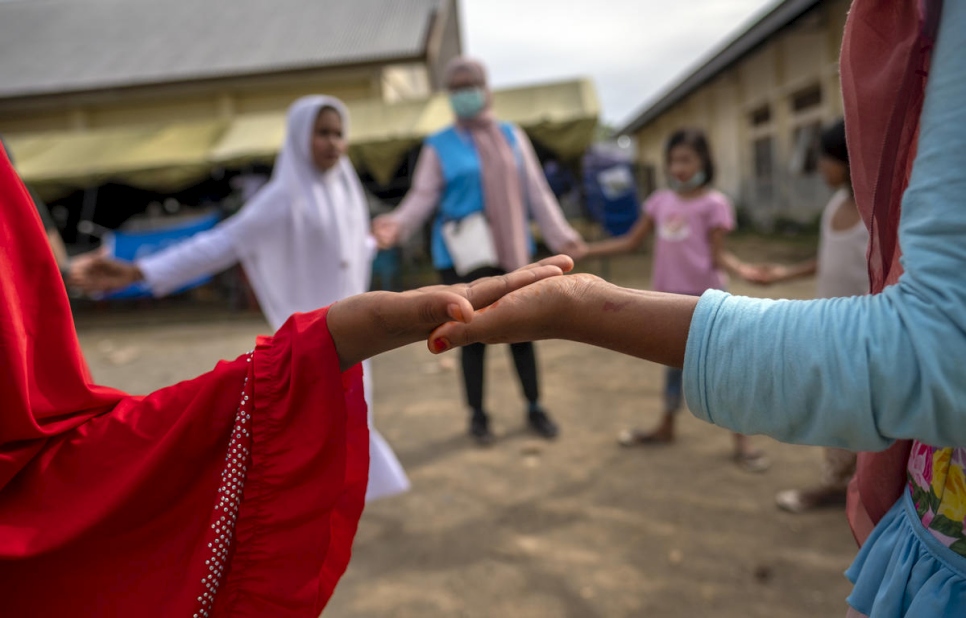 Rohingya refugees from Myanmar, enjoy being a children at a refugee site converted from an unused government complex in Lhokseumawe, northern Aceh Province of Indonesia. The site was meant for about 100 refugees but on 7 September 2020 roughly 300 Rohingya refugees landed, most of them are women and children after seven months at sea, creating very crowded conditions at the site. It was reported that they had departed from Cox's Bazar, Bangladesh, and the refugees had tried repeatedly to disembark in South East Asia countries to no avail for more than six months. More than 30 were reported to have passed away during the journey amid harrowing conditions. © UNHCR/Jiro Ose
Rohingya refugees from Myanmar, enjoy being a children at a refugee site converted from an unused government complex in Lhokseumawe, northern Aceh Province of Indonesia. The site was meant for about 100 refugees but on 7 September 2020 roughly 300 Rohingya refugees landed, most of them are women and children after seven months at sea, creating very crowded conditions at the site. It was reported that they had departed from Cox's Bazar, Bangladesh, and the refugees had tried repeatedly to disembark in South East Asia countries to no avail for more than six months. More than 30 were reported to have passed away during the journey amid harrowing conditions. © UNHCR/Jiro Ose
UNHCR, the UN Refugee Agency, and humanitarian partners, are observing a dramatic increase in the number of people attempting perilous crossings of the Andaman Sea this year.
Some 1,920 people, mostly Rohingya, travelled by sea from January to November 2022, from Myanmar and Bangladesh, compared to only 287 in 2021, a more than sixfold increase.
UNHCR warns that attempts at these journeys are exposing people to grave risks and fatal consequences. Tragically, 119 people have been reported dead or missing on these journeys, this year alone.
The most recent arrivals were recorded a fortnight ago when more than 200 people arrived in North Aceh, Indonesia, on two boats. UNHCR welcomes and appreciates the efforts of authorities to safely disembark and receive the groups.
Refugees who safely disembarked on the Indonesian coast are currently being hosted in a former Immigration office in Lhokseumawe. UNHCR, together with IOM and partners, is present and working closely with the local authorities to help support the refugees, including through registration, providing for their basic needs and working to ensure secure and adequate accommodation for the two groups.
UNHCR has also received unverified reports of more boats adrift at sea containing passengers who urgently require life-saving rescue and attention.
With increasing levels of desperation and vulnerability forcing more refugees to make these deadly journeys, UNHCR and humanitarian partners continue to stress the need for increased regional and international cooperation to save lives and share responsibility.
Indonesia currently hosts nearly 13,000 refugees and asylum-seekers, mostly from Afghanistan, Somalia and Myanmar, and should not be alone in rescuing and disembarking people adrift at sea.
It is imperative that States in the region uphold their commitments made in 2005 under the Bali Process to collectively find solutions for those attempting these desperate journeys.
Following the onset of the Andaman Sea and Bay of Bengal crisis seven years ago, the Bali Process established the need for a reliable and collective response to this regional challenge. A comprehensive and fair response necessarily requires responsibility-sharing and concrete efforts across South-East Asia, so that those who enable disembarkation and bring those in distress to safety do not carry a disproportionate burden.
Officials involved in the Bali Process are scheduled to gather in Indonesia next week to mark the 20th anniversary of the Bali Process, ahead of a ministerial summit next year. With deteriorating conditions and desperation forcing more people to make these deadly journeys, UNHCR, along with humanitarian partners, stresses the need for increased regional and international cooperation to save lives.






